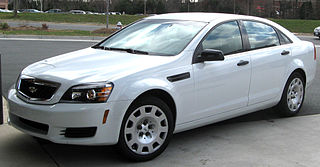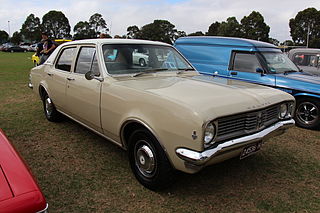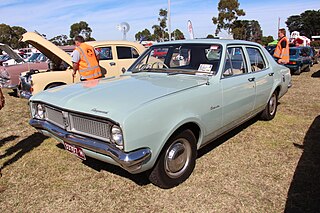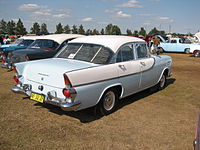
The Chevrolet Chevelle is a mid-sized automobile that was produced by Chevrolet in three generations for the 1964 through 1978 model years. Part of the General Motors (GM) A-body platform, the Chevelle was one of Chevrolet's most successful nameplates. Body styles included coupes, sedans, convertibles, and station wagons. The "Super Sport" versions were produced through the 1973 model year and Lagunas from 1973 through to 1976.

The Chevrolet Caprice is a full-sized automobile produced by Chevrolet in North America for the 1965 to 1996 model years. Full-size Chevrolet sales peaked in 1965 with over a million sold. It was the most popular car in the U.S. in the 1960s and early 1970s, which, during its lifetime, included the Biscayne, Bel Air, and Impala.

The Chevrolet El Camino is a coupé utility vehicle that was produced by Chevrolet between 1959–60 and 1964–1987. Unlike a standard pickup truck, the El Camino was adapted from the standard two-door Chevrolet station wagon platform and integrated the cab and cargo bed into the body.

The Holden Kingswood is a full-size car that was manufactured in Australia by GM Holden, from the beginning of the HK series in 1968 through to the conclusion of the WB series in 1984. Prior to 1968, the full-size Holden range of family cars comprised the Holden Standard, the Holden Special, and Holden Premier models. Initially, the HK range of models included the basic Holden Belmont, the Kingswood, and the luxury-oriented Holden Premier, all of which were manufactured in a choice of sedan and station wagon bodies. Commercial variants were offered in three types: coupé utility, panel van, and later from 1971, a heavy-duty Holden One Tonner cab chassis. The utility (ute) version was originally marketed in both Belmont and Kingswood configurations. However, after the Belmont name was deleted from commercials at the end of HQ in late 1974, the base model commercials were sold only with the "Holden" badge.

The Holden Gemini is a compact car that was produced by Holden and sold in Australasia from 1975 to 1986. It was based on the Japanese Isuzu Gemini, one of the many models based on the GM T-car platform.

The Holden EH is an automobile produced by General Motors-Holden in Australia from 1963 to 1965. The EH was released in August 1963 replacing the Holden EJ series, and was the first Holden to incorporate the new "Red" engine, with a seven main bearing crankshaft instead of the four main bearing crankshaft used in the "Grey" engine. At first, a larger capacity 149-cubic-inch (2,440 cc) engine was only sold attached to a three-speed manual gearbox or the "Hydramatic" four-stage automatic transmission with a column shift. The Controlled Coupling Hydramatic used in the EH was actually a four-stage, although it effectively worked as a three-speed unit, except at full throttle. The 179-cubic-inch (2,930 cc) engine was initially sold only with the "Hydramatic" transmission. The first EH with a 179-cubic-inch engine and a manual gear box was called the "EH-S4", and was fitted with an upgraded manual gearbox, having stronger gears than in the 149 gear box, and an upgraded clutch. The three-speed manual column shift gearboxes had no synchromesh on first gear, only on the second and third (top) gear.

The Holden was a full-sized car produced by the company of the same name across 5 generations from 1948 until 1984. The Holden is also commonly referred to by their model designation and also the H Series. The Holden was introduced to be Australia's car, being the first full scale produced automobile exclusive to the country. Prior to which, General Motors Holden's Ltd. assembled imported CKD kits from overseas General Motors subsidiaries such as Chevrolet, Buick, Vauxhall and more. And the only other cars built in the country being Ford and Chrysler vehicle bodies fitted to imported chassis. The Holden was an instant success among Australians, being the first production car built solely for Australia's unique, rough roads.

The Holden Special is a mid-size car that was manufactured by Holden for Australasia. Introduced as the top-level trim in the new Holden FJ range of 1953, the Special was complemented by the entry-level Holden Standard and the mid-range Holden Business. The Business was in fact already available, introduced in July 1953 in the 48 series first seen in 1948. Three months later, the FJ was introduced, therefore forming a three-model lineup based around one car. A "Standard"-type variant also existed in the 48 series, but had been marketed simply as the "Holden".

Statesman is an automotive marque created in 1971 by the Australian General Motors subsidiary, Holden. Statesman vehicles were sold through Holden dealerships, and were initially based on the mainstream Holden HQ station wagon platform, thereby providing more interior room and generally more luxurious features than their Holden-branded sedan siblings. Production ceased with the last of the WB series cars in December 1984.

The Holden HQ series is a range of automobiles that was produced by Holden in Australia from 1971 to 1974. The HQ was released on 15 July 1971, replacing the Holden HG series. It was the first ground-up redesign of the Holden line since its original release in 1948, and included an all-new body, chassis, and suspension. The HQ was later developed into a series of successor models, finally ending production when the WB series was discontinued in 1984.

The Holden FE is an automobile produced by Holden in Australia from 1956 until 1958. It was also the first Holden to be assembled in New Zealand, where General Motors New Zealand built their first example on 31 January 1957.

The Holden HK series is an automobile which was produced by Holden in Australia from 1968 to 1969. Introduced in January 1968, the HK range progressively replaced the Holden HR series which had been in production since 1966. HK models were both larger and heavier than their predecessors and the range would ultimately include thirteen different models against the eight of the HR range. The Holden HK was marketed under Belmont, Kingswood, Premier, Brougham and Monaro model names.

The Holden HJ is a series of automobiles which were produced by Holden in Australia from 1974 to 1976. The HJ series was released on 4 October 1974 and was an improved and facelifted version of the superseded Holden HQ series which had been in production since 1971.

The Holden EJ is a motor vehicle produced by General Motors-Holden's in Australia from 1962 to 1963. Introduced in July 1962, the EJ replaced the Holden EK series.

The Holden FC series is an automobile produced by Holden in Australia from 1958 to 1960. Introduced on 6 May 1958, the FC is a facelifted and improved version of the Holden FE series, which it replaced. Although it is exclusively an Australian design, the styling is reminiscent of a scaled-down North American 1955 Chevrolet.

The Holden HT series is a range of automobiles which was produced by Holden in Australia between 1969 and 1970.

The Holden HG is an automobile which was produced by Holden in Australia between 1970 and 1971. It was marketed under Belmont, Kingswood, Premier, Brougham and Monaro model names.

The Holden EK series is a motor vehicle produced by Holden in Australia from 1961 to 1962. Introduced on 2 May 1961, the EK series was a facelifted version of the Holden FB, which it replaced.

The Holden HD series is a range of automobiles which were produced by Holden in Australia from 1965 to 1966.

The Holden HR is an automobile that was produced by Holden in Australia from 1966 to 1968.




























